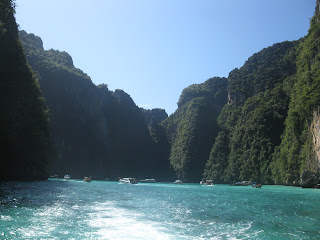When I read the newspapers every morning, I am often taken aback by how neighbouring countries are always displeased with each other. Take for instance, Pakistan and India, Israel and Palestine, North Korea and South Korea, North Sudan and South Sudan, and a long string of never ending list.
Whenever news of these conflicts reach my eyes and ears, the first question I'll ask is "why?". Why do they want to fight? Why are they at war? Why is it that even after they split, they are still quarrellings with each other? Can't they just live in peace? Can't they settle it in a civilized manner?
Nope. Apparently, they have to fight it out. Throwing bombs, planting suicide bombers in the midst of a multitude, kidnapping, threatening, flying war planes over each others heads... these are just some of the atrocities that they have gone through just to show their dissatisfaction and state their point.
So, I was overjoyed when on the first day of the workshop, we were informed that there would be 66 participants who hailed from 16 countries, gathered from every continent of the globe, who would be joining us. It'll be a small gathering of nations. A wonderful opportunity for me to find out all about everything I've ever wanted to know about other countries, directly from the citizens themselves.
Frankly, three days is too short to build a relationship that is enough for us to trust and open up to each other to discuss issues which are considered to be politically sensitive. Nevertheless, it is sufficient for us to gauge the response of their opinions on certain subjects.
Most of the young, like me, are relatively uninterested in the progress of politics in our own countries. After all, we have a whole, bright future ahead of us. Why would we be concerned with politics? Besides, it's not even in our place to change the way the game is played. Our voices are lost. It's soft. People say we should focus on our careers first, whatever they are, and creating families. Venturing into politics, can come much later.
The veterans, on the other hand, love to elaborate on what they think. When I asked an Iranian on the embargo situation in his motherland, he said, "You know? The embargo isn't so bad, after all. When you think about it, because of this embargo, we learn how to be self-sufficient. We develop our own technology, we are independent. We don't have to rely on anyone."
"But... " I remarked, "Because of the embargo, you won't get to have any US Products in Iran, right?"
The Iranian bats his eyelids, raises his eyebrows, and looks straight at me, "How do you know?"
"I have friends in Sudan, who is also under embargo, and they can't have any US products there, such as KFC, or BurgerKing..." my mind... as usual, is flooded with thoughts about food.
"Ahah!" The Iranian exclaims triumphantly. "That, is where you are wrong. No matter what kind of obstructions are placed in our way, we will always overcome adversities that we face. We have our own ways and means getting what we want." he winks.
"But, it comes with a price. The prices that are charged, are three times higher than those sold in the open market. And you know who's the one who profits the most from this embargo???"
He pauses with a knowing look. As if he's communicating with me telepathically. I got it. I nodded as an indication.
"Yup. You got it! You see, it is all done with a hidden, political agenda. But, we Persians are a strong nation. Look at our history. As cities rise and fall, as wars come and go, we will survive. We, have survived for thousands of years, despite the odds. The situation now isn't any different than it was before. No matter what happens, we know, we will definitely keep on living and be a victorious nation."
It certainly touched a raw nerve of mine to meet somebody who has been part of the Iranian revolution, who's been through thick and thin in his own country, and yet, still have so much faith in the future of his country. He neither complains nor laments about his fate. Instead, he does his best to ensure that his country will be a better one for the children of his future generation. In this aspect, I am impressed. It teaches me so much about the important qualities that one should possess as a leader, like the prophet who led his team out of the desert. Faith, confidence, hope and loads of initiatives.
"So," it's his turn now to quiz me. "All countries are more often than not, enemies with their neighbours. Who's Malaysia's strongest 'enemy' among all the neighbouring countries?"
"Ummm... " I was stunned for a while. Who? Malaysia works alongside with Thailand on several joint-ventures. It's competitive with Thailand for tourists though. Malaysia is always quarreling with Indonesia about the haze, how they should quench the fires, venting their frustrations about the smog and open burning of forest fires, maids, and a whole bunch of other important health, safety and environmental matters. Singapore? Well, that will reveal cans after cans of dispute! Shipping routes, migrations and emigrations of Malaysians to Singapore, discrimination towards Malaysians in Singapore, the way history is written about Singapore in Malaysia, business ventures, bridges, economical preferences, island borders ... ... ..
"Singapore. Definitely Singapore." I answered, after much thought.
"Ahhh!" The Iranian revolutionist winks again. " See! Every country has its own dose of disputes to settle. Some are just more major than the others. And you know what? We just have to learn to deal with it."
That said, the conversation we had that day, felt like attending an open lecture on a Saturday morning to me. Whisked me around to look at things from a totally new dimension.
















































